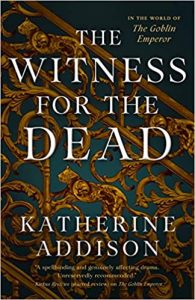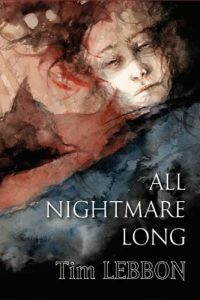Liz Bourke Reviews The Witness for the Dead by Katherine Addison
 The Witness for the Dead, Katherine Addison (Tor 978-0-765-38742-4, $25.99, 240pp, hc) June 2021.
The Witness for the Dead, Katherine Addison (Tor 978-0-765-38742-4, $25.99, 240pp, hc) June 2021.
The Witness for the Dead isn’t a sequel, focusing as it does on an almost entirely different cast of characters and set as it is far away from the imperial court. But despite its altered milieu, it has a similar flavour, with an intimate, personal emotional register and a thematic concern with duty and ethics, loneliness and connection, choices and consequences.s Sarah Monette, Katherine Addison has written a tetralogy (Mélusine, The Virtu, The Mirador, Corambis) and co-written a trilogy with Elizabeth Bear (A Companion to Wolves and sequels), but she is best known for the award-winning The Goblin Emperor (2014), a novel about an isolated young man who succeeds unexpectedly to the rulership of an empire; about his loneliness and his struggle to do right by his responsibilities, his role, and what remains of his family: a struggle to be a kind man and an ethical emperor. Fans have long awaited a sequel, or at least another volume in the same universe, and The Witness for the Dead does not disappoint.
Readers of The Goblin Emperor will remember Thara Celehar, the shy and retiring prelate of Ulis to whom the emperor Maia (reigning as Edrehasivir IV) turned to investigate who killed his father and half-brothers. Celehar, though successful in his commission, took no delight in it, nor did he really want any tangible reward the emperor could offer him. Now he resides in Amalo, a provincial town best known for its airship industry, in an awkward position – neither fish nor fowl – with the city’s religious hierarchy, followed by politics but wanting no real part in them.
Celehar’s gifts and talents make him a natural Witness for the Dead, for he is able to communicate, in some fashion, with the shades of the recently deceased, and the role of a Witness for the Dead is to be their advocate. His decency and fundamental honesty – and his kindness – means the work takes a toll on his spirit. Celehar comes across as a man who’s haunted, in more than one sense of the word, and one who feels his duty keenly: he wants to be useful.
When the body of a young woman washes up in the river, Celehar’s duties include finding out who she is and investigating how she died. When it turns out that someone killed her, part of his role becomes finding the murderer. This leads him into Amalo’s opera scene, where it transpires that the young woman was greatly disliked, and into the business and secrets of a high-strung opera company and its very personable manager.
This investigation isn’t the sum total of Celehar’s duties, even if it is, at the moment, perhaps the central one. Witnessing in the case of a disputed will causes political problems that see him sent out of town to deal with a ghoul problem in the countryside in the middle of his investigation. On his return, his honesty and calling are questioned, and he is forced to prove himself by ordeal. And searching the cemeteries of the city for the grave of a distraught man’s sister – buried by a husband who cut her and her newborn child off from her family – leads him to the discovery of a series of murders.
Part of the appeal of a murder mystery – and The Witness for the Dead is very much a murder mystery – especially a historical or a fantastical one, is the exploration of the world, the piece-meal revelation of how things fit together, or don’t fit when they should, that is the context of the mystery. The most common failure mode of a fantasy mystery is when it lacks the depth of world, the depth of field, to offer a rich background and a rich foreground into which the red herrings, deceits, and diversions can fall. That is not a failure to which The Witness for the Dead is susceptible. Addison’s prose breathes life to a world full of details, a world that makes sense – socially, culturally, in its contradictions and nuances – in itself, which we see through Celehar’s eyes. His assumptions about how the world works, and about how the world views him – his poverty, his painful humility, his… shyness or loneliness or both – are only mostly true, and the details give us perhaps a more rounded picture, at least of him, than he himself notices. Amalo is a city with as much character as a real place, as intricate and as believable as London, Paris, or Hong Kong.
In other hands The Witness for the Dead might come across as a noir or as cosy, but as a mystery novel it’s not easily slotted into either category. Like The Goblin Emperor, it’s fundamentally humane, sensitive, and kind. Celehar is a compelling protagonist, and as always, Addison gives her characters striking and engaging voices. The Witness for the Dead is an accomplished and enjoyable novel, and I believe fans of The Goblin Emperor will find much to delight them here.
Liz Bourke is a cranky queer person who reads books. She holds a Ph.D in Classics from Trinity College, Dublin. Her first book, Sleeping With Monsters, a collection of reviews and criticism, is out now from Aqueduct Press. Find her at her blog, her Patreon, or Twitter. She supports the work of the Irish Refugee Council and the Abortion Rights Campaign.
This review and more like it in the May 2021 issue of Locus.
 While you are here, please take a moment to support Locus with a one-time or recurring donation. We rely on reader donations to keep the magazine and site going, and would like to keep the site paywall free, but WE NEED YOUR FINANCIAL SUPPORT to continue quality coverage of the science fiction and fantasy field.
While you are here, please take a moment to support Locus with a one-time or recurring donation. We rely on reader donations to keep the magazine and site going, and would like to keep the site paywall free, but WE NEED YOUR FINANCIAL SUPPORT to continue quality coverage of the science fiction and fantasy field.
©Locus Magazine. Copyrighted material may not be republished without permission of LSFF.






